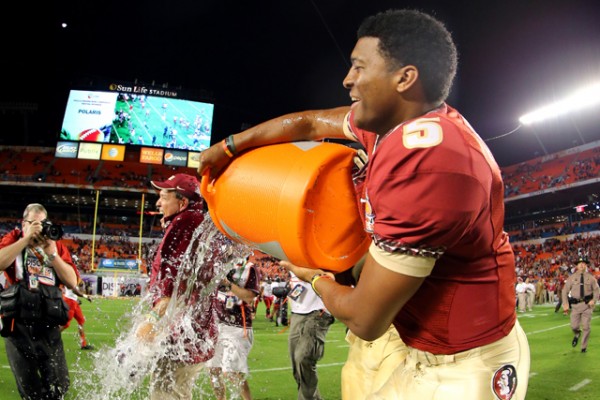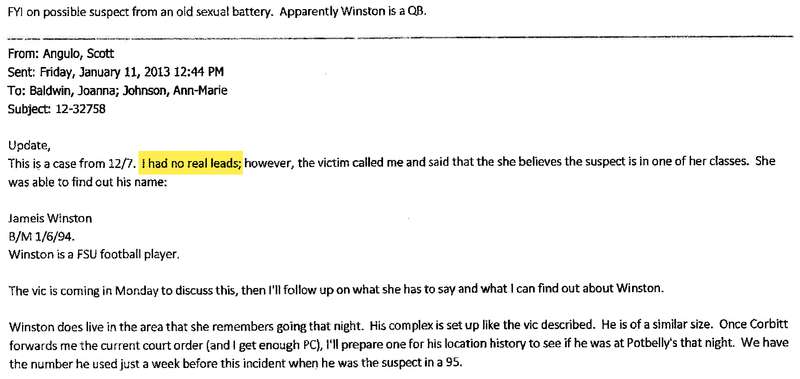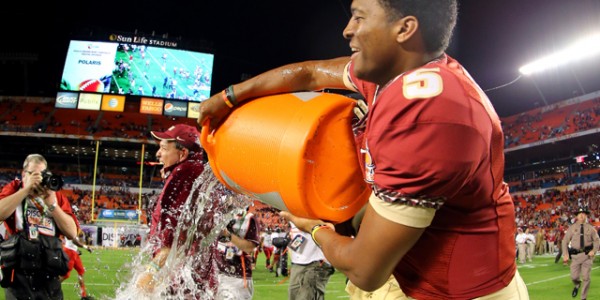
Justice is an abstract notion, and too many people that there are a few too many unanswered question marks about the alleged rape charges against Jameis Winston, the Heisman winner from Florida State, and according to a very interesting piece by the New York Times (A Star Player Accused, and a Flawed Rape Investigation), better police work by the Tallahassee department could have brought everyone a much clearer version of the truth.
Officer Scott Angulo of Tallahassee’s special victims unit was handed the case. According to the accuser’s attorney, he tried to persuade her not to pursue the case, because “Tallahassee is a big football town.” His leads? he accuser’s story about meeting three men at Potbelly’s (a local bar), remembering that one of them was a football player named Chris (Chris Casher), and claiming that the four of them took a taxi home.
Angulo’s first report came two months after the alleged assault, and didn’t bring much to the table. He did ask the Taxi company to email its drivers with a description of the accuser and the three men, getting no response. However, he didn’t go to Potbelly’s and request contents of their 30 surveillance cameras, something the prosecutor’s office did after being made aware of the case 11 months after the incident, which meant the tapes were already reused, and didn’t look for a football player named Chris who took a video of the sexual encounter but had time to delete it before anyone asked him to hand it over.

It took more than month for the police to identify Winston as one of the suspects after the accuser recognized him in class. What did the police do next? They waited two weeks before they contacted him, by phone, and Winston got himself a lawyer, saying that Winston won’t be speaking to them. Angulo decided not to obtain any DNA evidence from Winston, and the accuser claim Angulo refused to do so because of the publicity it would generate.
Angulo declared the case suspended. In his report he cited a lack of cooperation from the victim. Obviously, this isn’t something both sides agree on. What do they agree on? Police never informed the accuser or her attorney that they had discontinued their investigation.
But then reports of a second incident floated:
A month before the rape accusation became public, the university’s victim advocate learned that a second woman had sought counseling after a sexual encounter with Mr. Winston, according to the prosecutor’s office. The woman did not call it rape — she did not say “no.” But the encounter, not previously reported, “was of such a nature that she felt violated or felt that she needed to seek some type of counseling for her emotions about the experience,” according to Georgia Cappleman, the chief assistant state attorney, who said she had spoken with the advocate but not with the woman. The victim advocate was concerned enough about the episode to have alerted Mr. Winston’s first accuser. Ms. Cappleman said that based on what she was told, a crime had not been committed. Nonetheless, Ms. Cappleman said she found the encounter troubling, because it “sheds some light on the way Mr. Winston operates” and on what may be “a recurring problem rather than some type of misunderstanding that occurred in an isolated situation.”
The detective work began only 11 months after the incident of the alleged rape. The prosecutor’s office started moving the chains. The players were questioned The taxi drivers as well. DNA linking Winston to his accuser was obtained and analyzed. The prosecutors decided there wasn’t enough compelling evidence to bring Winston and the others to be charged, but noted that better police work would have made a huge difference.
The university made an internal investigation, but was not made aware of the situation when it should have been back in January 2013. SU’s investigation did not begin until after football season, and Winston declined to cooperate. Through his attorney, he declined to answer questions for the Times story as well: When The Times asked Mr. Winston for an interview, an Atlanta lawyer advising his family, David Cornwell, responded, “We don’t need an investigation, thorough or otherwise, to know that Jameis did not sexually assault this young lady.” Mr. Cornwell, who has represented major sports figures and the N.F.L., added, “Jameis has never sexually assaulted anybody.”
Hat tip: Deadspin & New York Times

One response to “Jameis Winston Case – What the Tallahassee Police Did Wrong”
[…] Sportige […]